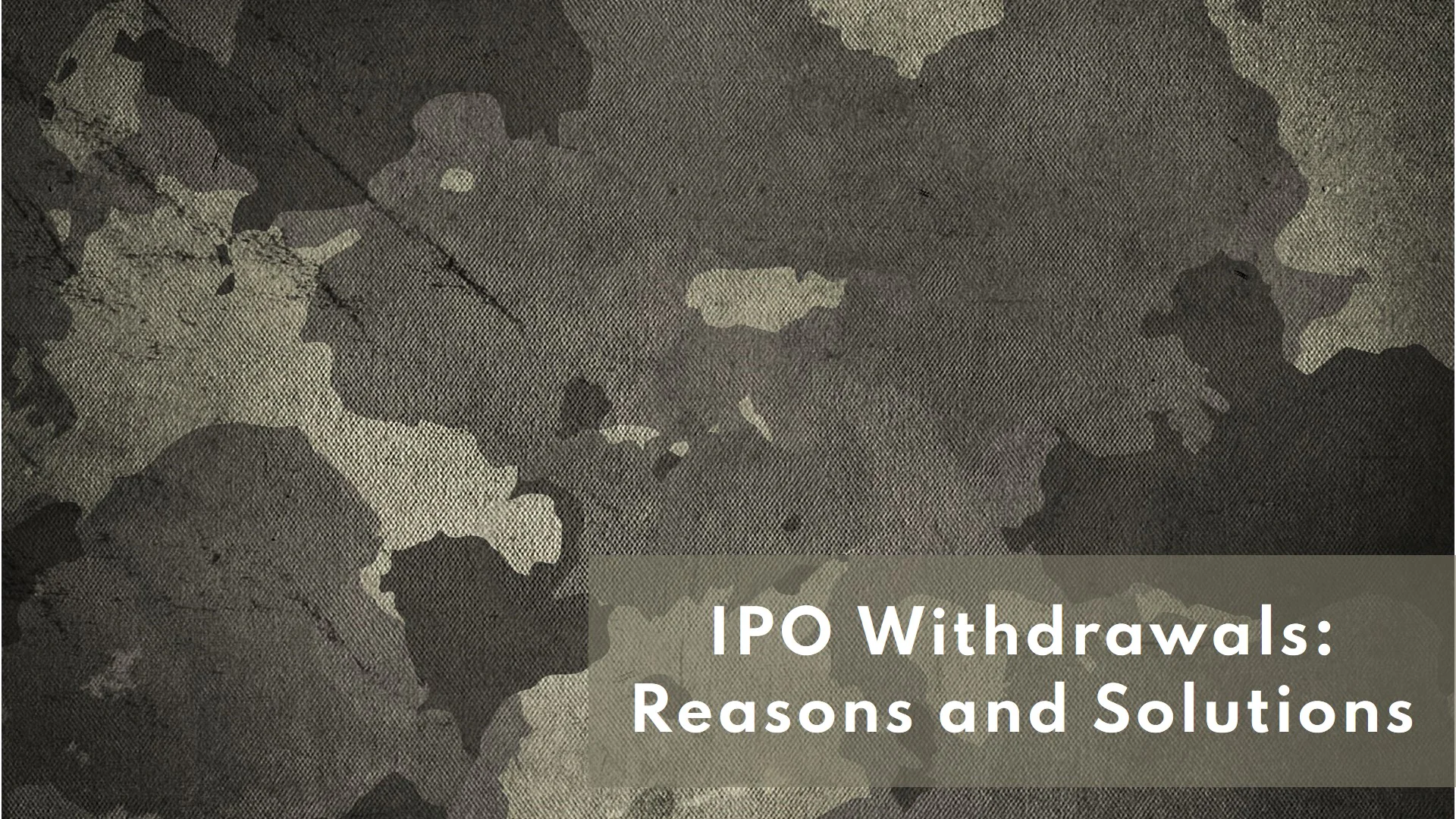IPOs are widely believed to be significant events for firms because they establish firms in the market and also give early investors chances to exit the business through the sale of their stakes. However, all those IPOs do not see the light of the day. Sometimes, companies may choose to pull their IPOs depending on some factors that consist of; Market Fluctuations and internal Issues, among others. These elements will be examined in detail in this article with regards to their relevance that can either lead to the withdrawal of an IPO and the implications it has on both the firm and potential Investors.
Table of Contents
Adverse Market Conditions
The most apparent reason for the termination of an IPO is market conditions that are deemed unfavourable. Stock market is unstable and one can find that due to some changes in the global economy, the mood of investors can rapidly deteriorate. In general, if the total market is slugging it out or volatile, firms might refrain from floating their shares in the stock market because they may not attract the anticipated demand. The public during these periods withdraws from investing in the risky business, a factor that makes it difficult for companies to obtain the right amount of capital they require.
For instance, in the year 2008 many firms pulled out their IPOs due to the adverse conditions in the marketplace. Likewise in recent years, things like the current COVID-19 pandemic have affected the market thereby making companies reconsider their timing for this process. Companies can be put off by their Initial Public Offerings if the timing is bad because that leads to low stock prices.
Regulatory Issues
Regulatory challenges also lead to pullbacks by some companies regarding their IPOs. Public companies, therefore, must meet several legal conditions such as disclosure financial reporting and audits. In this case, if a company is unable to meet these requirements, or if there are challenges during the review then, a company’s IPO might be delayed or canceled.
At times, such challenges include issues such as the financial position of the firm, corporate governance, and other management factors. If these issues are serious, then the IPO may be suspended to avoid bringing such problems into operation as they will harm the company’s image and the market.
Poor Financial Performance
The other key reason that causes IPO withdrawal is the poor financial performance of the firms. Companies with efficiency and growth prospects are the most popular among investors. A company may choose not to go public if they have realized that its revenues, profits or other factors relevant to its IPO have reduced in the time preceding its decision.
Sometimes, when a company is financially weak, it becomes almost impossible to attract investors during an IPO. If they decide to go forward with the offering, the shares might take a long time to sell or might not sell enough just as planned leading to limited capital being raised. It’s for this reason that firms may prefer to take their IPOs off the market due to fear of poor performance.
Overvaluation Concerns
Valuation constitutes a significant fundamental element that will determine success or failure in an IPO. If a company’s price is considered high by investors, they would not be willing to purchase the stock at the offered price. Another mistake is overvaluation when a company offers its shares at a price higher than they are worth against earnings, market position or growth potential. In such cases, the institutional and retail investors may not be able to invest enough in the IPO.
That is why, to prevent it, companies organize a road show, the result of which will determine investor interest and market conditions. When clients who might invest in the stock note that the company is overpriced, the management of the company may choose to pull out the IPO and review the pricing policy. Another sign is also overvaluation because investors may feel that the company is trying to appeal to the latest trend instead of providing.
Internal Company Issues
Management conflict, legal issues or problems, and internal issues refer to crises that can also cause the withdrawal of IPOs. Accordingly, if there are some underlying problems within the company, its going public might amplify these disturbances under the pressure of investor and regulator scrutiny. For instance, a legal case or change of executiveshurtct on the investors’ confidence and an uncertain situation in the firm can occur.
At times, even the management of the company may come to the understanding that it is too soon for it to prepare for the public company regime. Doing business in the public domain requires more disclosure, more rules and regulations as well as more expectations from the shareholders. If a company is unable to take on such responsibilities we may decide to pull out the IPO and work on correcting internal problems before coming back to the issue of going public.
Lack of Investor Interest
Another cause of coupon-based IPOs getting withdrawn is lesser investor response. In general, when a company is preparing for an IPO, it announces a preliminary price that it plans on offering its shares. However, in case institutional or retail investors are not interested in the company’s prospects as expected, the demand for its shares will also not meet expectations. This can translate into the company rebidding on its prices or worse still pulling out of the IPO.
One reason could be due to several factors that make consumers indifferent to a product. Shareholders may have some anxieties connecting with the business’s future, the condition of the business sector it works in, or opposition. However, there are other blockers such as market saturation or the existence of better investment opportunities to attend. Once a company realizes that its IPO may not attract sufficient investor interest to meet its desired level of capital, withdrawal is far more desirable than a public disappointment.
Timing and Seasonality
IPO timing is very important this is because; Every year it has its peak and low period, that is, there are certain months or seasons of the year whereby the movement of the stock price is high or low respectively due to prior patterns of activities. For instance, there are features such as the summer season, and the end of the calendar year which may see low trading volume; a condition that might prove volatile to a company trying to secure capital from the public during an IPO. If the planned IPO of a company falls during such periods, it may decide to pull out to the next suitable period of the calendar year.
This means that macroeconomic factors such as inflation rate, interest rate or geopolitical issues including civil unrest among others may cause use withdrawal of an IPO decision. Finally, timing could also hinder the full effectiveness of the offering and result in a low offering price, and less capital to be raised.
Reputation Concerns
Public image is one aspect that is well appreciated by firms, more so with the process of going public. A bad IPO experience is always a negative signal and can lead to a company’s loss of reputation, with negative repercussions in the years to come for investor relations. Sometimes if a company feels that their IPO is going to perform badly, it is much better to pull the offer so as not to go down in the stock markets. They meant it gives the company a better opportunity to counter the market-related stigma that should come when their stock debut is struggling.
At times negative events may also occur threatening the reputation of the firm before the launch of the IPO. For instance, negative information such as unfavorable details in the media, legal cases involving the company’s management or its operations, negative or scandalous information on the business activities, and any information that may hurt the corporation may discourage investors from investing in the IPO. In such occurrences, the company should pull the offering and sort out these problems before trying again to go public.
Strategic Changes
Companies might change over time and sometimes may have different goals. In some cases, a company may consider going public as the right approach to funding or expanding its business line but as time passes the management may change their mind on the strategy best suited to the firm. For example, a firm might find private capital, venture capital, or strategic alliances that adequately meet its capital requirement without making it go public.
Another reason is the change of business model, for instance, in its attempt to achieve long-term growth or in carrying out acquisitions or mergers and acquisitions. Holding the IPO, the company can focus on positioning, enhancing its financial status, or adjusting the business processes for more successful and promising future offers.
Conclusion
Despite the increase in IPOs as another significant step in the development of any company, several circumstances can underlie its cancellation. Such factors as unfavorable market situations, issues with the regulators, lowered operating profits, and lack of demand from investors, are some of the main causes that may make some firms decide to suspend their IPOs. Also, internal customer needs and wants, internal organization changes or developments, and sometimes reputation and image can heavily influence this process.
Pulling an offering is not always a bad thing. It can also be attributed to the fact that most firms seek to avoid risks that result from going public at the wrong time or the wrong prices. Withdrawing an IPO is beneficial for organizations to have time to deal with internal as well as external issues and set themselves up for stronger IPO outcomes at a later time.
In conclusion, IPO withdrawals can be painful for those who do not get an opportunity to participate in share float, but it is usually a well-calculated business move to float again at a better time in the market. Similarly, investors also need to be very aware of the causes behind such pullouts to make effective decisions when investing in the future.




